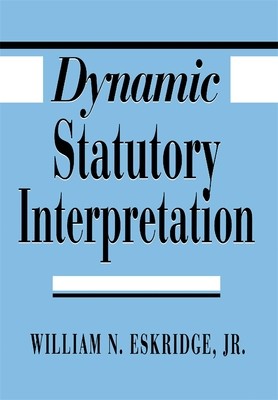
- We will send in 10–14 business days.
- Author: William N Eskridge
- Publisher: Harvard University Press
- ISBN-10: 0674218787
- ISBN-13: 9780674218789
- Format: 17.4 x 24.3 x 2.9 cm, hardcover
- Language: English
- SAVE -10% with code: EXTRA
Reviews
Description
Contrary to traditional theories of statutory interpretation, which ground statutes in the original legislative text or intent, legal scholar William Eskridge argues that statutory interpretation changes in response to new political alignments, new interpreters, and new ideologies. It does so, first of all, because it involves richer authoritative texts than does either common law or constitutional interpretation: statutes are often complex and have a detailed legislative history. Second, Congress can, and often does, rewrite statutes when it disagrees with their interpretations; and agencies and courts attend to current as well as historical congressional preferences when they interpret statutes. Third, since statutory interpretation is as much agency-centered as judge-centered and since agency executives see their creativity as more legitimate than judges see theirs, statutory interpretation in the modern regulatory state is particularly dynamic.
Eskridge also considers how different normative theories of jurisprudence--liberal, legal process, and antiliberal--inform debates about statutory interpretation. He explores what theory of statutory interpretation--if any--is required by the rule of law or by democratic theory. Finally, he provides an analytical and jurisprudential history of important debates on statutory interpretation.EXTRA 10 % discount with code: EXTRA
The promotion ends in 18d.03:55:34
The discount code is valid when purchasing from 10 €. Discounts do not stack.
- Author: William N Eskridge
- Publisher: Harvard University Press
- ISBN-10: 0674218787
- ISBN-13: 9780674218789
- Format: 17.4 x 24.3 x 2.9 cm, hardcover
- Language: English English
Contrary to traditional theories of statutory interpretation, which ground statutes in the original legislative text or intent, legal scholar William Eskridge argues that statutory interpretation changes in response to new political alignments, new interpreters, and new ideologies. It does so, first of all, because it involves richer authoritative texts than does either common law or constitutional interpretation: statutes are often complex and have a detailed legislative history. Second, Congress can, and often does, rewrite statutes when it disagrees with their interpretations; and agencies and courts attend to current as well as historical congressional preferences when they interpret statutes. Third, since statutory interpretation is as much agency-centered as judge-centered and since agency executives see their creativity as more legitimate than judges see theirs, statutory interpretation in the modern regulatory state is particularly dynamic.
Eskridge also considers how different normative theories of jurisprudence--liberal, legal process, and antiliberal--inform debates about statutory interpretation. He explores what theory of statutory interpretation--if any--is required by the rule of law or by democratic theory. Finally, he provides an analytical and jurisprudential history of important debates on statutory interpretation.

Reviews